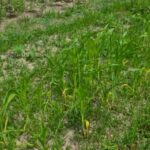Are you interested in starting a vegetable garden in Georgia? The key to successful gardening in this state lies in understanding the climate and soil, choosing the right vegetables for each season, and knowing when to plant and care for them. In this article, we will provide a comprehensive guide to help you navigate through the Georgia vegetable gardening calendar.
Georgia’s diverse climate and soil conditions can offer both opportunities and challenges for vegetable gardening. Whether you are a beginner or an experienced gardener, understanding the unique characteristics of Georgia’s climate and soil is crucial for a successful harvest. From preparing the garden bed to winterizing your vegetable garden, we will cover everything you need to know to create a thriving garden all year round.
In the following sections, we will delve deeper into specific topics such as planting and caring for spring vegetables, growing summer vegetables with ease, fall vegetable gardening recommendations, and winterizing your garden for the colder months. By the end of this article, you will be equipped with the knowledge and tips needed to create your own successful Georgia vegetable gardening calendar. Let’s get started.
Understanding the Climate and Soil in Georgia for Successful Vegetable Gardening
When it comes to successful vegetable gardening in Georgia, understanding the climate and soil of the region is crucial. Georgia has a humid subtropical climate, with hot and muggy summers and mild winters. The state also experiences high levels of rainfall, which can impact the success of vegetable crops. Understanding these climate factors will help gardeners choose the right vegetables for each season and make necessary adjustments to ensure a bountiful harvest.
In addition to considering the climate, it’s important to understand the soil in Georgia for vegetable gardening. The state’s soil varies from region to region, with some areas having sandy soil and others having clay-like soil. Before planting, it’s essential to test the soil to determine its pH level and nutrient content. Based on these findings, gardeners can then amend the soil as needed to create optimal growing conditions for their chosen vegetables.
With a better understanding of the climate and soil in Georgia, gardeners can select vegetables that are well-suited to the region’s conditions. Some vegetables that thrive in Georgia’s climate and soil include tomatoes, peppers, okra, collard greens, sweet potatoes, and cucumbers. By choosing the right vegetables for each season and preparing the soil accordingly, gardeners can set themselves up for a successful harvest throughout the year.
Overall, by understanding Georgia’s climate and soil for successful vegetable gardening, gardeners can make informed choices about what to plant when and how to prepare their gardens for optimal growth. By taking these factors into consideration and making any necessary adjustments, gardeners can increase their chances of yielding a plentiful harvest throughout the year in Georgia’s diverse climate.
Choosing the Right Vegetables for Each Season in Georgia
When planning a successful vegetable garden in Georgia, it is crucial to choose the right vegetables for each season. Understanding the climate and soil conditions in Georgia is essential for selecting the appropriate vegetables that will thrive throughout the year. Whether you are planning to plant in spring, summer, fall, or winter, there are specific vegetables that are well-suited for each season in Georgia.
Spring Vegetables
In Georgia, spring is an ideal time to plant cool-season vegetables such as lettuce, spinach, kale, carrots, and radishes. These vegetables prefer cooler temperatures and can withstand light frosts, making them perfect for the fluctuating spring weather in Georgia. It is essential to start planting these vegetables as soon as the soil can be worked in early spring.
Summer Vegetables
When it comes to summer vegetable gardening in Georgia, it is crucial to choose heat-tolerant varieties that can withstand the hot and humid climate. Some popular summer vegetables include tomatoes, peppers, cucumbers, squash, and okra. These warm-season vegetables require plenty of sunlight and consistent watering to thrive during the intense Georgia summers.
Fall Vegetables
As summer comes to an end in Georgia, it’s time to shift focus to planting fall vegetables. Cool-season crops like broccoli, cauliflower, Brussels sprouts, and cabbage are excellent choices for fall gardening in Georgia. These vegetables thrive in the milder temperatures of autumn and can tolerate light frost, allowing for a bountiful harvest well into the season.
By choosing the right vegetables for each season in Georgia based on their specific climate and soil conditions, you can ensure a successful and productive vegetable garden year-round. Understanding the timing and requirements of each season will help you plan your garden effectively according to the Georgia vegetable gardening calendar.
Preparing the Garden Bed and Soil in Georgia for Planting
When it comes to preparing the garden bed and soil for planting in Georgia, there are a few key factors to keep in mind. Georgia’s climate and soil conditions can vary across the state, so it’s important to understand what will work best for your specific area. The first step in preparing your garden bed is to test the soil.
You can do this with a simple at-home soil test kit or by sending a sample off to a professional lab. This will help you determine the pH level of your soil and if any amendments are needed.
Once you have an understanding of your soil composition, you can start preparing the garden bed. In Georgia, raised beds are a popular option for vegetable gardening as they provide better drainage and can be filled with high-quality soil. If you choose to garden directly in the ground, be sure to loosen the soil and incorporate plenty of organic matter such as compost or well-rotted manure.
Another important consideration for preparing the garden bed in Georgia is mulching. Mulch helps retain moisture, suppress weeds, and regulate soil temperature. Organic mulches such as straw or wood chips are great options for vegetable gardens. Lay down a thick layer of mulch around your plants once they’re established to help keep them healthy throughout the growing season.
By taking these steps to prepare your garden bed and soil in Georgia, you’ll be setting yourself up for success when it comes time to plant your vegetables according to the georgia vegetable gardening calendar.
Planting and Caring for Spring Vegetables in Georgia
After understanding the climate and soil in Georgia, it’s time to dive into planting and caring for spring vegetables in your garden. Here are some tips and tricks for a successful spring vegetable garden in Georgia:
1. Choose the right vegetables: When it comes to spring vegetables in Georgia, it’s important to choose plants that can tolerate the cool temperatures that are still present during this season. Some great options for spring planting include lettuce, spinach, carrots, radishes, and peas.
2. Prepare the garden bed: Before planting your spring vegetables, make sure to prepare the garden bed and soil properly. Remove any weeds or debris from the area and add organic matter such as compost to enrich the soil and provide nutrients for your plants.
3. Planting and care: Once your garden bed is prepared, it’s time to plant your spring vegetables. Follow the instructions on each seed packet or plant tag for proper spacing and depth. Make sure to water regularly, especially during periods of dry weather, and keep an eye out for any pests or diseases that may affect your plants.
4. Additional tips: Consider using row covers or cloches to protect your spring vegetables from unexpected frost events that can occur in Georgia during the spring months. These simple coverings can help extend your growing season and protect your plants from cold temperatures.
By following these tips, you can ensure a successful spring vegetable garden in Georgia and enjoy a bountiful harvest throughout the season. Stay tuned for more information on growing summer vegetables in Georgia later in this article.
Growing Summer Vegetables in Georgia
When it comes to growing summer vegetables in Georgia, there are a few tips and tricks that can help you have a successful harvest despite the heat. With temperatures often soaring during the summer months, it’s important to choose the right vegetables and provide them with proper care to ensure they thrive in the Georgia climate.
Choosing the Right Vegetables
One of the key considerations when growing summer vegetables in Georgia is selecting varieties that are well-suited to the hot and humid conditions. Heat-tolerant vegetables like tomatoes, peppers, cucumbers, okra, and eggplant are excellent choices for summer gardening in Georgia. These vegetables are able to withstand the high temperatures and abundant sunlight that are characteristic of the Georgia summer.
Providing Adequate Watering
During the hot Georgia summer, it’s essential to ensure that your vegetable garden receives an adequate amount of water. Regular watering is crucial for preventing plants from becoming stressed or wilting in the heat. Consider using a drip irrigation system or soaker hoses to deliver water directly to the base of your plants, minimizing evaporation and ensuring that they receive consistent moisture.
Protecting Against Pests and Diseases
The warm and humid conditions in Georgia can also create an environment that is favorable for pests and diseases that can threaten your vegetable garden. Keep an eye out for common pests such as aphids, squash bugs, and hornworms, as well as diseases like powdery mildew and bacterial wilt. Implementing measures such as companion planting, applying organic pest controls, and practicing good garden hygiene can help prevent these issues from taking hold in your summer vegetable garden.
By choosing heat-tolerant vegetables, providing ample water, and taking steps to protect against pests and diseases, you can set yourself up for a successful summer vegetable gardening season in Georgia.
Fall Vegetable Gardening in Georgia
When it comes to fall vegetable gardening in Georgia, there are plenty of options to choose from. The moderate temperatures and ample sunlight during the fall season make it an ideal time for growing a variety of vegetables. Here are some popular vegetables to plant in the fall in Georgia:
- Broccoli
- Cauliflower
- Cabbage
- Brussels sprouts
- Carrots
- Lettuce
- Spinach
- Radishes
Understanding the planting schedule is crucial for a successful fall vegetable garden in Georgia. Planting times may vary depending on the specific region within the state, so it’s important to consult a Georgia vegetable gardening calendar for exact dates. Generally, it’s best to plant fall vegetables in late summer or early fall to ensure a bountiful harvest before the first frost.
In addition to timing, it’s also important to consider the soil and climate conditions when planning a fall vegetable garden in Georgia. Amending the soil with organic matter and ensuring proper drainage will help create an optimal growing environment for fall vegetables. Additionally, providing adequate irrigation during drier periods will support healthy plant growth throughout the season. By paying attention to these factors, gardeners can look forward to a successful and abundant fall harvest.
By following these guidelines for planting and caring for fall vegetables in Georgia, gardeners can enjoy a fruitful autumn harvest of delicious and nutritious produce. So whether you’re an experienced gardener or just starting out, there are plenty of opportunities to grow a diverse range of vegetables during the fall season in Georgia.
Winterizing Your Georgia Vegetable Garden for the Colder Months
As the colder months approach, it is essential to properly prepare your Georgia vegetable garden for winter. The key to successful winterizing is to protect your plants from freezing temperatures and ensure they have the best chance of surviving until the next growing season. Here are some tips for winterizing your Georgia vegetable garden:
One important step in winterizing your vegetable garden is to clean up and remove any debris or dead plant material. This will help prevent disease and pests from overwintering in your garden and causing problems in the spring. It’s also a good time to add any organic matter, such as compost or mulch, to help improve the soil for the next growing season.
Another crucial aspect of winterizing your Georgia vegetable garden is protecting your plants from freezing temperatures. You can do this by using frost cloth or row covers to insulate your plants and keep them warm during cold spells. Additionally, consider mulching around the base of your plants to help regulate soil temperature and protect their roots from freezing.
Finally, don’t forget to properly water your vegetable garden before winter sets in. While you don’t need to water as frequently as during the growing season, it’s still important to keep the soil moist before it freezes. This will help ensure that your plants have enough moisture to survive the winter months.
By taking these steps to winterize your Georgia vegetable garden, you can help ensure that your plants survive the colder months and thrive once spring arrives. Properly preparing your garden for winter will set you up for a successful growing season next year.
Conclusion and Final Tips for a Successful Georgia Vegetable Gardening Calendar
In conclusion, Georgia offers a unique climate and soil that can make vegetable gardening a rewarding experience for both seasoned gardeners and beginners. By understanding the specific conditions of the region and choosing the right vegetables for each season, you can ensure a successful harvest throughout the year.
With proper preparation of your garden bed and soil, as well as careful attention to planting and caring for your crops, you can enjoy an abundance of fresh produce from your own backyard.
As you navigate through the seasons, it’s important to remember to winterize your garden for the colder months. Taking steps to protect your plants from frost and cold temperatures will help ensure their survival through winter. Additionally, staying informed about potential pests and diseases that may affect your crops is essential in maintaining the health of your garden.
For an optimal Georgia vegetable gardening calendar, make sure to consult resources such as the Georgia Vegetable Gardening Calendar, which provides valuable information on when to plant specific vegetables in each region of Georgia. With dedication, patience, and knowledge of the local climate and soil conditions, you can create a thriving vegetable garden that will provide you with fresh, homegrown produce year-round. Happy gardening.
Frequently Asked Questions
When Should I Start My Vegetable Garden in Georgia?
In Georgia, the best time to start your vegetable garden is in early spring, around March or April. This timing allows for the soil to warm up and reduces the risk of frost damage to your plants.
What Veggies Grow Best in GA?
Certain vegetables thrive in Georgia’s climate, including tomatoes, peppers, okra, squash, and collard greens. These veggies are well-adapted to Georgia’s hot and humid summers and can yield a bountiful harvest when planted and cared for properly.
What Month Should I Plant My Vegetable Garden?
The ideal month to plant your vegetable garden in Georgia is typically March. This timing allows for the soil to thaw and warm up after the winter months, providing optimal conditions for seeds and seedlings to germinate and grow into healthy plants.

If you’re looking to get into vegetable gardening, or are just looking for some tips on how to make your current garden better, then you’ve come to the right place! My name is Ethel and I have been gardening for years. In this blog, I’m going to share with you some of my best tips on how to create a successful vegetable garden.





